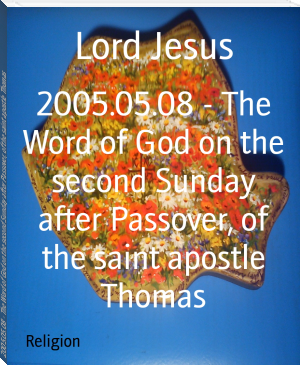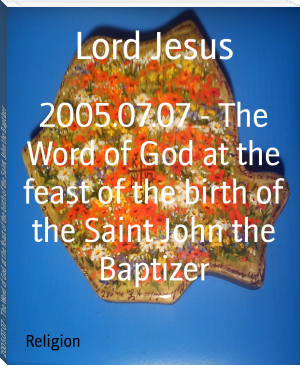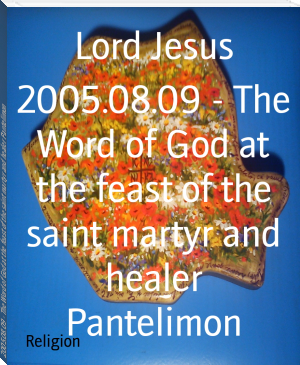The Story of a Soul, Saint Thérèse de Lisieux [android e book reader txt] 📗

- Author: Saint Thérèse de Lisieux
- Performer: -
Book online «The Story of a Soul, Saint Thérèse de Lisieux [android e book reader txt] 📗». Author Saint Thérèse de Lisieux
Fully aware of my obligations, I set to work, and strove to redouble my fervour. Now and again I wrote to my new brother. Undoubtedly, it is by prayer and sacrifice that we can help our missionaries, but sometimes, when it pleases Our Lord to unite two souls for His Glory, He permits them to communicate their thoughts, and thus inspire each other to love God more. Of course an express command from those in authority is needed for this, otherwise, it seems to me, that such a correspondence would do more harm than good, if not to the missionary, at least to the Carmelite, whose manner of life tends to continual introversion. This exchange of letters, though rare, would occupy her mind uselessly; instead of uniting her to God, she would perhaps fancy she was doing wonders, when in reality, under cover of zeal, she was doing nothing but producing needless distraction.—And here am I, launched, not upon a distraction, but upon a dissertation equally superfluous. I shall never be able to correct myself of these lengthy digressions which must be so wearisome to you, dear Mother. Forgive me, should I offend again.
Last year, at the end of May, it was your turn to give me my second brother, and when I represented that, having given all my merits to one future apostle, I feared they could not be given to another, you told me that obedience would double their value. In the depths of my heart I thought the same thing, and, since the zeal of a Carmelite ought to embrace the whole world, I hope, with God's help, to be of use to even more than two missionaries. I pray for all, not forgetting our Priests at home, whose ministry is quite as difficult as that of the missionary preaching to the heathen. . . . In a word, I wish to be a true daughter of the Church, like our holy Mother St. Teresa, and pray for all the intentions of Christ's Vicar. That is the one great aim of my life. But just as I should have had a special interest in my little brothers had they lived, and that, without neglecting the general interests of the Church, so now, I unite myself in a special way to the new brothers whom Jesus has given me. All that I possess is theirs also. God is too good to give by halves; He is so rich that He gives me all I ask for, even though I do not lose myself in lengthy enumerations. As I have two brothers and my little sisters, the novices, the days would be too short were I to ask in detail for the needs of each soul, and I fear I might forget something important. Simple souls cannot understand complicated methods, and, as I am one of their number, Our Lord has inspired me with a very simple way of fulfilling my obligations. One day, after Holy Communion, He made me understand these words of the Canticles: "Draw me: we will run after Thee to the odour of Thy ointments."[1] O my Jesus, there is no need to say: "In drawing me, draw also the souls that I love": these words, "Draw me," suffice. When a soul has let herself be taken captive by the inebriating odour of Thy perfumes, she cannot run alone; as a natural consequence of her attraction towards Thee, the souls of all those she loves are drawn in her train.
Just as a torrent carries into the depths of the sea all that it meets on its way, so, my Jesus, does the soul who plunges into the shoreless ocean of Thy Love bring with it all its treasures. My treasures are the souls it has pleased thee to unite with mine; Thou hast confided them to me, and therefore I do not fear to use Thy own words, uttered by Thee on the last night that saw Thee still a traveller on this earth. Jesus, my Beloved! I know not when my exile will have an end. Many a night I may yet sing Thy Mercies here below, but for me also will come the last night, and then I shall be able to say:
"I have glorified Thee upon earth: I have finished the work which Thou gavest me to do. I have manifested Thy name to the men whom Thou hast given me out of the world. Thine they were, and to me Thou gavest them; and they have kept Thy word. Now they have known that all things which Thou hast given me are from Thee: because the words which Thou gavest me I have given to them; and they have received them, and have known for certain that I came forth from Thee, and they have believed that Thou didst send me. I pray for them: I pray not for the world, but for them whom Thou hast given me, because they are Thine. And all mine are Thine, and Thine are mine; and I am glorified in them. And now I am no more in the world, and these are in the world, and I come to Thee. Holy Father, keep them in Thy name, whom Thou hast given me, that they may be one, as we also are one. And now I come to Thee, and these things I speak in the world, that they may have my joy filled in themselves. I do not ask that Thou take them away out of the world, but that Thou preserve them from evil. They are not of the world, as I also am not of the world. And not for them only do I pray, but for those also who through their word shall believe in me. Father, I will that where I am they also whom Thou hast given me may be with me, that they may see my glory which Thou hast given me, because Thou hast loved me before the foundation of the world. And I have made known Thy name unto them, and will make it known, that the love wherewith Thou hast loved me may be in them and I in them."[2]
Yea, Lord, thus would I repeat Thy words, before losing myself in Thy loving embrace. Perhaps it is daring, but, for a long time, hast thou not allowed me to be daring with Thee? Thou hast said to me, as the Prodigal's father to his elder son: "All I have is thine."[3] And therefore I may use thy very own words to draw down favours from Our Heavenly Father on all who are dear to me.
My God, Thou knowest that I have ever desired to love Thee alone. It has been my only ambition. Thy love has gone before me, even from the days of my childhood. It has grown with my growth, and now it is an abyss whose depths I cannot fathom.
Love attracts love; mine darts towards Thee, and would fain make the abyss brim over, but alas! it is not even as a dewdrop in the ocean. To love Thee as Thou lovest me, I must make Thy Love mine own. Thus alone can I find rest. O my Jesus, it seems to me that Thou couldst not have overwhelmed a soul with more love than Thou hast poured out on mine, and that is why I dare ask Thee to love those Thou hast given me, even as Thou lovest me.
If, in Heaven, I find that thou lovest them more than Thou lovest me, I shall rejoice, for I acknowledge that their deserts are greater than mine, but now, I can conceive no love more vast than that with which Thou hast favoured me, without any merit on my part.
. . . . . . .
Dear Mother, what I have just written amazes me. I had no intention of writing it. When I said: "The words which Thou gavest me I have given unto them," I was thinking only of my little sisters in the noviciate. I am not able to teach missionaries, and the words I wrote for them were from the prayer of Our Lord: "I do not ask that Thou shouldst take them out of the world; I pray also for them who through their word shall believe in Thee."
How could I forget those souls they are to win by their sufferings and exhortations?
But I have not told you all my thoughts on this passage of the Sacred Canticles: "Draw me—we will run!" Our Lord has said: "No man can come to Me except the Father Who hath sent Me, draw him,"[4] and later He tells us that whosoever seeks shall find, whosoever asks shall receive, that unto him that knocks it shall be opened, and He adds that whatever we ask the Father in His Name shall be given us. It was no doubt for this reason that, long before the birth of Our Lord, the Holy Spirit dictated these prophetic words: "Draw me—we will run!" By asking to be drawn, we desire an intimate union with the object of our love. If iron and fire were endowed with reason, and the iron could say: "Draw me!" would not that prove its desire to be identified with the fire to the point of sharing its substance? Well, this is precisely my prayer. I asked Jesus to draw me into the Fire of His love, and to unite me so closely to Himself that He may live and act in me. I feel that the more the fire of love consumes my heart, so much the more shall I say: "Draw me!" and the more also will souls who draw near me run swiftly in the sweet odour of the Beloved.
Yes, they will run—we shall all run together, for souls that are on fire can never be at rest. They may indeed, like St. Mary Magdalen, sit at the feet of Jesus, listening to His sweet and burning words, but, though they seem to give Him nothing, they give much more than Martha, who busied herself about many things. It is not Martha's work that Our Lord blames, but her over-solicitude; His Blessed Mother humbly occupied herself in the same kind of work when she prepared the meals for the Holy Family. All the Saints have understood this, especially those who have illumined the earth with the light of Christ's teaching. Was it not from prayer that St. Paul, St. Augustine, St. Thomas Aquinas, St. John of the Cross, St. Teresa, and so many other friends of God drew that wonderful science which has enthralled the loftiest minds? "Give me a lever and a fulcrum on which to lean it," said Archimedes, "and I will lift the world."
What he could not obtain because his request had only a material end, without reference to God, the Saints have obtained in all its fulness. They lean on God Almighty's power itself and their lever is the prayer that inflames with love's fire. With this lever they have raised the world—with this lever the Saints of the Church Militant still raise it, and will raise it to the end of time.
Dear Mother, I have still to tell you what I understand by the sweet odour of the Beloved. As Our Lord is now in Heaven, I can only follow Him by the footprints He has left—footprints full of life, full of fragrance. I have only to open the Holy Gospels and at once I breathe the perfume of Jesus, and then I know which way to run; and it is not to the first place, but to the last, that I hasten. I leave the Pharisee to go up, and full of confidence I repeat the humble prayer of the Publican. Above all I follow Magdalen, for the amazing, rather I should say, the loving audacity, that delights the Heart of Jesus, has cast its spell upon mine. It is not because I have been preserved from mortal sin that I lift up my heart to God in trust and love. I feel that even had I on my conscience every crime one could commit, I should lose nothing of my confidence: my heart broken with sorrow, I would throw myself into the Arms of my Saviour. I know that He loves the Prodigal Son, I have heard His words to St. Mary Magdalen, to the woman taken in adultery, and to the woman of Samaria. No one could frighten me, for I know what to believe concerning His Mercy and His Love. And I know that all that multitude of sins would disappear in an instant, even as a drop of water cast





Comments (0)